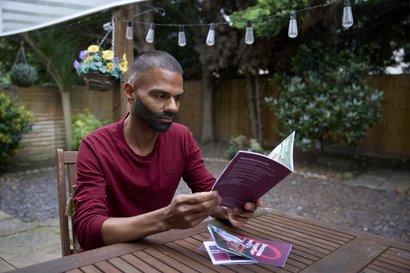Understanding treatment for follicular lymphoma
Some people with follicular lymphoma might not need any treatment (or may not need it straight away). If you do need treatment, the aim is to reduce the amount of lymphoma cells in your body to very low or even undetectable amounts.
Key things to know
- There are lots of different treatment options for follicular lymphoma, and your doctor will recommend the best one for you based on things like your age, your general health, and where the lymphoma is in your body.
- The aim of treatment is to manage your symptoms and reduce the number of lymphoma cells to low or even undetectable amounts.
- If you’re worried about treatment, or you don’t want to have treatment, speak to your hospital team. They can tell you what to expect if you do or don’t have it.
Treatment aims
The aim of treatment is to reduce the amount of lymphoma cells in your body to very low or undetectable amounts (this means that there are so few lymphoma cells left that they can't be seen by a test or scan.) Some people refer to this as going into remission, but others don't like to use that term as the cancer hasn't gone away completely and might come back.
The type of treatment you have will depend on things like your symptoms, the stage of the follicular lymphoma, and your overall health.
"Ask your doctor what treatments are available. If you know what your options are, you have choices. If you're worried about anything, you can ask for explanations, question decisions, and seek a second opinion."
Malcolm, living with follicular lymphoma since 2018. Read more real stories from people affected by blood cancer.

Why don't I need treatment?
If you’re diagnosed with early stage follicular lymphoma, or you don’t have any symptoms yet, your doctor may decide it’s best to delay treatment. This is called being on active monitoring, which is sometimes referred to as “watch and wait”.
If you’re on active monitoring, you’ll have regular check-ups and your doctor will watch carefully for any signs that the lymphoma is growing. They may repeat some tests from time to time. You should let them know straight away if you develop any new symptoms or if something just doesn’t feel right.
It can be hard to accept you have cancer but aren’t being offered treatment, and our mind and emotions page contains a few suggestions on how to cope with worry and anxiety. It’s also worth knowing that some treatments for follicular lymphoma can be difficult for your body to cope with, and you might get unwanted side effects. Waiting until treatment will have the biggest impact is better than having it when you don’t really need it, and delaying treatment won’t affect how effective it is when you do have it.
What if I don't want to have treatment?
Lots of people find the idea of having treatment scary, and some treatments can leave you feeling quite poorly. However, everybody reacts differently to treatment, and you might have a completely different experience to someone you know. If you’re worried about anything, there will be plenty of time to ask questions and share your preferences with your hospital team.
Some people don’t want to have any treatment at all, or may not want the kind of treatment their doctor recommends for them. If you have any concerns about this, you should speak to your hospital team. You have a right to choose whether you have treatment or not, and your doctor can explain what will happen if you don’t.
You can also give us a call on 0808 2080 888 - our nurses can help you build a relationship with your team and plan what to say to them.

Order printed health information
Our blood cancer information is written with expert medical professionals and people affected by blood cancer. Our information booklets cover many different types of blood cancer and topics, including information for people newly diagnosed.
More About This